Jonathan Spencer: Introduction
The following texts were written by students with whom I have worked this year in a course on the anthropology of the political. The pieces were written in a few days between March 23-30; they are necessarily immediate and unpolished. Two authors (Elizabeth Fraser and Pelagie Couroyer) are final-year undergraduates, two (Anna Brooke and Juan Mejía) are MSc students. Elizabeth is Scottish, Anna is English, Pelagie is French, and Juan is from Honduras. The title is taken from Pelagie’s piece and brings out the tricks the pandemic has already played with our sense of time, and in some cases, space. Written as she packs her bags to make a dash back to France, she worries about the apparent suspension of certain kinds of critique in the face of emergency. Elizabeth tracks the virus as it moves from remote to close to immediate, and asks what anthropology has given her by way of resources with which to respond. Juan tacks between his presence in Edinburgh, awaiting the next round of instructions for the “online scramble,” and his mother’s movements past military checkpoints in Honduras, but he also moves back and forth in time, invoking earlier experiences of curfew in Honduras, and the political imperatives that seemed to accompany them. The incongruity between the University’s institutional response, and the immediacies of the moment, is a recurring theme. Anna’s final piece details an absurd gift that magically generates new forms of sociality in a previously anomic housing block.
Pelagie Couroyer: The End of Time, not Time
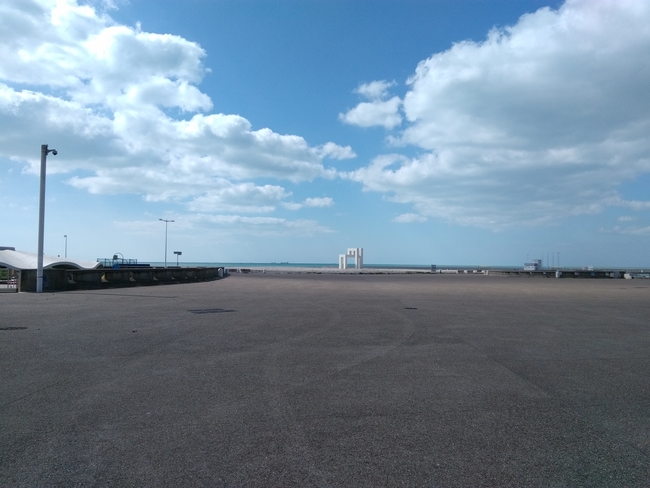
Juan Mejía: Discourses of Contagion, Dreams of Anthropology
As the morning wears off, I have come to the eerie realization that for the last weeks there have been competing demands for me to exist in two worlds that seem to share their blindness, as well as their determination, with sleepwalkers. As 1 pm in Edinburgh gets closer, for the first time in a week I start checking my official university email to find the specific adjustments every course has made for the online scramble, just in time for my alarm to start. Away from the glories of British higher education, in 7 am Tegucigalpa, the absolute military-run curfew imposed on all major Honduran cities will be lightened, but not lifted. I follow my mother’s trail, with her fake “essential” industry identification, and enough money to get out of a checkpoint or two, to reach the supermarket and later leave basic supplies at my grandmother’s house.
The irresistible charm of a good text on the co-production of state and kinship at noon, with its redeeming promise of high marks and knowledge, exists in a different place from my mother and a disinterested soldier. In Honduras, my home country, we have had curfews every few years, crisis since the dawn of written history, and an unspoken intimacy with discourses of contagion. Hence, an official message with the president surrounded by military men, regardless of where you are, becomes an object of intense scrutiny. It might be the need to stop gang violence 15 years ago, the dangers of “chavismo” ten years ago, domestic terrorism, youth vandalism, or coronavirus, but the announcement of an absolute curfew is received with a rush towards a week of supplies and towards the alleged safety of home.
During curfew, life is supposed to be interrupted, two or three months of political frenzy with vast periods of staying at home. Reacting to a crisis in any other manner has always seemed like a kind of betrayal. During a long university strike, when the possibility of students accepting the implementation of distance learning emerged, a classmate screamed: “Normal lectures? With so many arrested and dead, that is impossible!” Context aside, the demands of being a student in a prestigious private university, away from home and funded with difficulty from a feeble public budget, now create a parallel sense of guilt. What was I pursuing in this university? Was it a degree like those that often adorn Honduran living rooms which would open a gate or two? Or was it the dream of learning new and different ways of working with ideas in anthropology?
Vanity becomes at times indistinguishable from genuine intellectual curiosity, but for the sake of argument let’s put my vanity aside and consider the dream of anthropology. It is a dream that sends shivers down my spine and that seems distorted, not by the contingencies of a crisis, but by the imperative to transform higher education into a degree-printing machine. The higher education system can seem gilded. The scramble into distance learning is a demand that cannot be ignored. A demand for a double betrayal and double existence in two times, 1 pm in glory and 7 am at home.
Elizabeth Fraser: Contagion: From the Classroom to the “Real” World
On Monday March 23, Boris Johnson appeared on our television screens and interrupted normal programming to announce the lockdown. I had an interview earlier in the day for a graduate programme. My self-isolating interviewer, who was alone rather than heading a panel, and on Skype rather than in person, remarked as she looked over my transcript how ironic it was that I was taking an anthropology course called Contagion in the middle of a pandemic.
And yes, a silver lining of Covid-19 is that it has proven to my hard science-subscribing family that medical anthropology is a valuable discipline to pursue. Every time I phone her, my mother now talks about the virus “revealing so much about what’s wrong with society.” The posts spilling one by one onto our social media feeds like a pot of bad news boiling over are all in some way about structural violence:
• People we know on zero-hour contracts admitting they have lost their jobs overnight with no compensation.
• Lists of tweets from American food servers who think they might be infected but can’t afford to take unpaid sick leave, so go into work anyway.
• Desperate pleas from NHS Lothian asking for volunteers to come to hospitals and feed patients because there are not enough employees to keep up after years of under-funding and under-staffing in the name of austerity.
• Caroline Criado Perez, author of Invisible Women (2019), pointing out that “small” size medical face masks are a men’s small, so on smaller women are often ill-fitting and loose, leaving them more susceptible to infection.
Glancing at Facebook may now not be much different from scanning the reading list of a medical anthropology class.
Yet, did my Contagion course prepare me for lockdown any better than anyone else? Despite talking about little else in class, Covid-19 was easy to brush away. It was terrible, of course, but so far off. Even when it reached Europe for the first time, and then reached England for the first time, I stupidly felt safe tucked away in Scotland. My first encounter with it was in early February, when I went into an independent pharmacy on a main street in Edinburgh with a friend, and the woman behind the till sighed with relief at the sight of us. “I’m just glad you didn’t ask for a face mask,” she said, pointing to a scrawled sign behind her saying there were none left, “All the Chinese are taking them.”
My “freak out” moment did not arrive till March 12, when I was travelling by train from my parents’ house back to Edinburgh. I felt like I could not move an inch lest I touch a surface and be contaminated. I sat stock still, staring at a news alert reporting that 200 people had died in Italy the previous day, and actually properly thought of how many bodies that is. 200 a day. A crushing weight of bodies. I entertained the possibility that my grandparents might be gone in a fortnight. And as I did so I was consciously disappointed in myself that I only bothered to take the time to have this realization when they were European bodies – close bodies, apparently to my mind more attention-worthy, bodies? Contagion may have made me a bit more informed than the average Briton, but it did not really drag me out of apathy (or Eurocentrism).
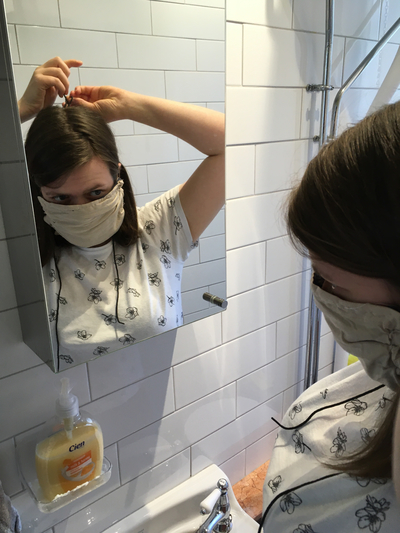
I took this picture of my flatmate the other day when we were going out to buy food. She is a healthcare student and was very worried about infection control so she cut up an old tshirt and some flannels and sewed us make-do masks following a YouTube video guide. This is her trying to get it fastened tight enough.
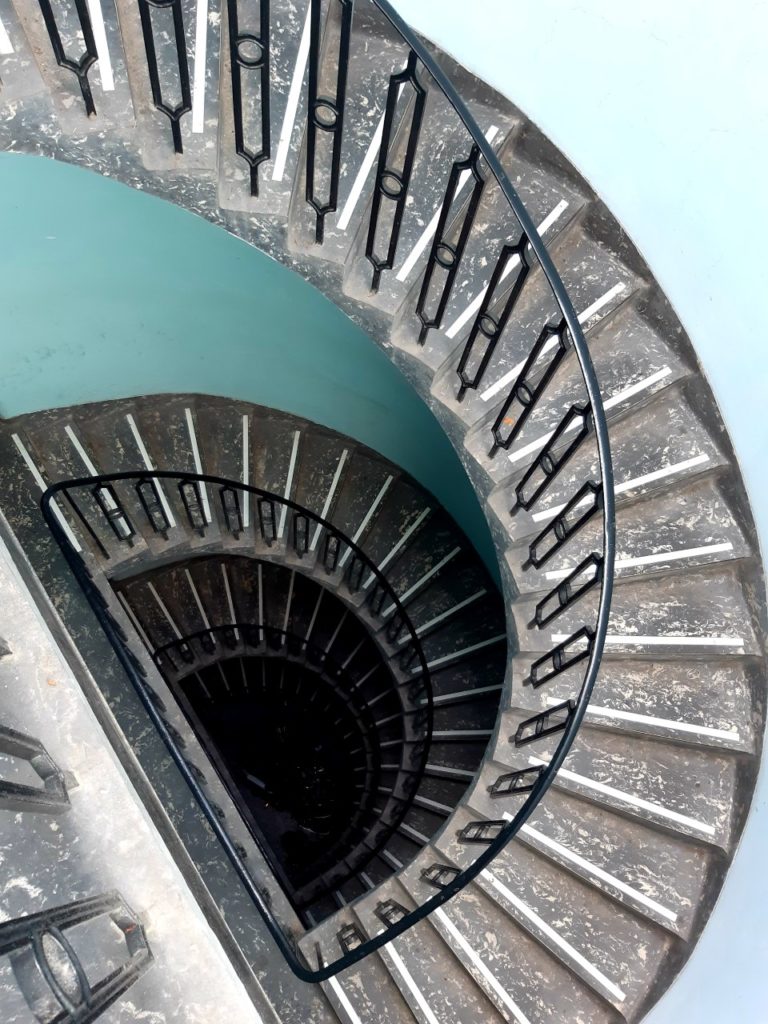
As the impending delivery loomed closer that day, the giant gift of toilet roll metaphorically seemed to unravel through the stairwell. We posted notes through each door, and there were conversations reacting to the somewhat surprising offer (a highly prized commodity!). Endearingly, my neighbor’s pink-cheeked embarrassment broke the ice each time. Over the next few days, it unleashed a back and forth of activity between neighbors, including creating a WhatsApp group, sharing chocolate cake and wine in the stairwell, agreeing to stamp loudly on the floor if ever in need, and an attempt at cat-sharing to try and catch an errant mouse (although the puss involved, Peggy, was more categorical in sticking to working from home).
Fortunately, in the end, my neighbor was able to send back the whole delivery. But the imaginary presence of the gift had been felt and it had opened up a palpable sense that there was a human, living presence and connection behind each of the front doors. In this moment, the compelling and humorous power of the gift was able to transgress what “social distancing” and “lockdown” might otherwise suggest, in a seemingly paradoxical move of unlocking social relations and creating solidarity.
Only time will tell if and how this extraordinary and deeply uncertain point in history might help us imagine different ways of relating in the world more generally, but it seems like now is the time to be asking the question.
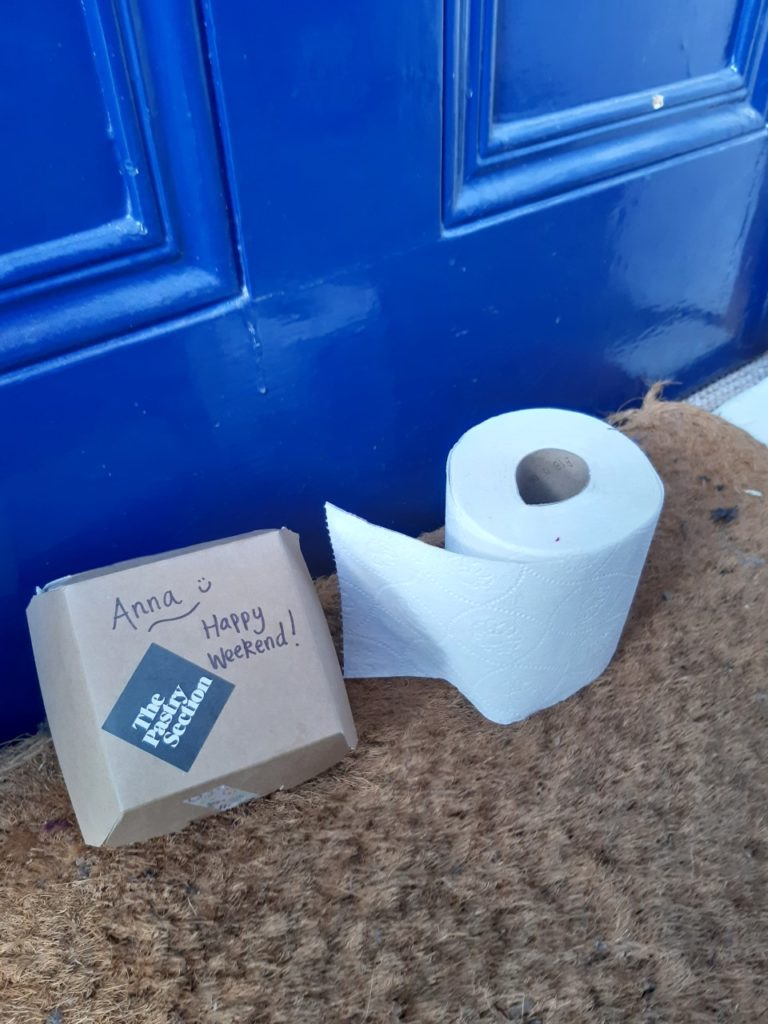
Jonathan Spencer: Building on Social Relations
Anna’s final piece concerns a gift so absurd it engenders new social relations. If we can reflect on these relations, it is just possible we can also build on them for a better future. The central episode, the threatened arrival of a mountain of toilet paper, is a helpful reminder that this is a crisis that has been marked by a great deal of shared humor, as well as terrible tragedy. The metaphoric overload in the story could keep most anthropologists happily distracted for years, but let me add one, rather obvious point. The obvious referent for Anna’s story is, of course, Marcel Mauss’s Essay on the Gift, a short text every anthropology student knows they have to pretend to have read, and which quite a few actually do read. In recent years, though, anglophone readers of Mauss have been reminded – most persistently and effectively by Keith Hart – of the political circumstances in which Mauss composed the essay, and which he quite explicitly intended to address in it. Mauss was writing as a politically highly engaged author, a socialist as much as a sociologist, addressing an audience that had been devastated by the calamity of the First World War. The Gift concludes with a utopian call for a science of “civility” or “civics” – the very stuff that links these different student reflections. Mauss’s final sentence is as good a reminder as any of what we, as students and teachers, can at once gain and give at moments like this: “Through studies of this sort we can find, measure and assess the various determinants . . whose sum is the basis of society and constitutes the common life, and whose conscious direction is the supreme art—politics in the Socratic sense of the word.”
Notes:
[1] Je veux dire à tous nos compatriotes qui vivent à l’étranger que … nous organiserons le rappatriement.
This article was originally published in American Ethnologist: https://americanethnologist.org/features/collections/covid-19-and-student-focused-concerns-threats-and-possibilities/when-the-clock-starts-moving-again
Cite As: Brooke, Anna, Pelagie Couroyer, Elizabeth Fraser, Juan Mejía, and Jonathan Spencer. 2020. “When the Clock Starts Moving Again.” In “COVID-19 and Student Focused Concerns: Threats and Possibilities,” Veena Das and Naveeda Khan, eds., American Ethnologist website, May 1 2020, [https://americanethnologist.org/features/collections/covid-19-and-student-focused-concerns-threats-and-possibilities/when-the-clock-starts-moving-again]
Anna Brooke, Pelagie Couroyer, Elizabeth Fraser, and Juan Mejía are all students of anthropology at the University of Edinburgh. Jonathan Spencer is the Regius Professor of South Asian Language, Culture, and Society at the University of Edinburgh.
(https://americanethnologist.org/features/collections/covid-19-and-student-focused-concerns-threats-and-possibilities/when-the-clock-starts-moving-again)
(https://americanethnologist.org/features/collections/covid-19-and-student-focused-concerns-threats-and-possibilities/when-the-clock-starts-moving-again)
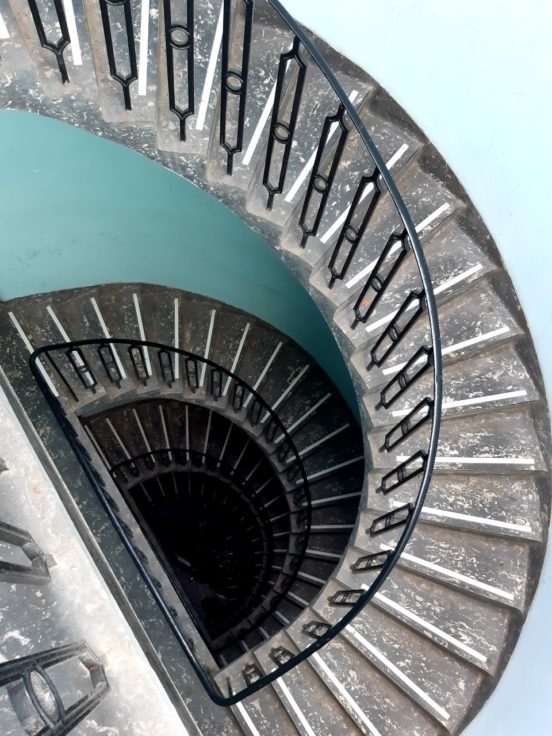
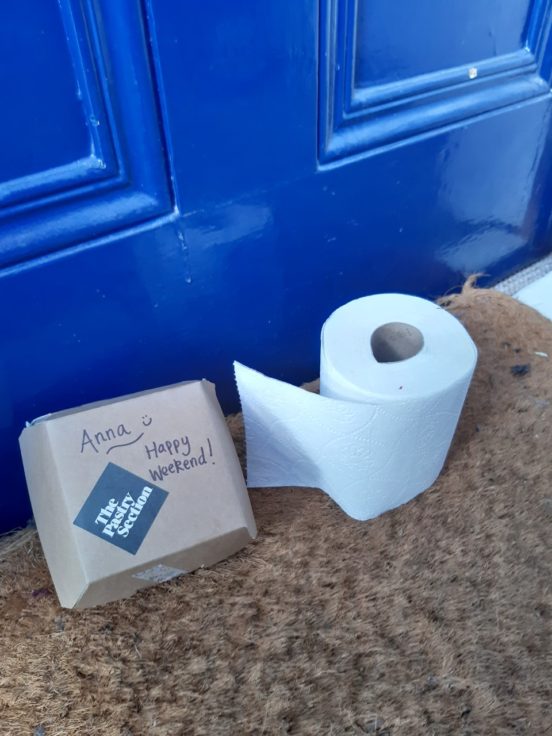
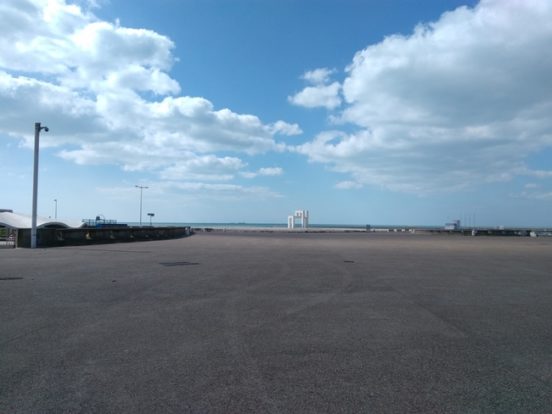









Comments by Ritti Soncco